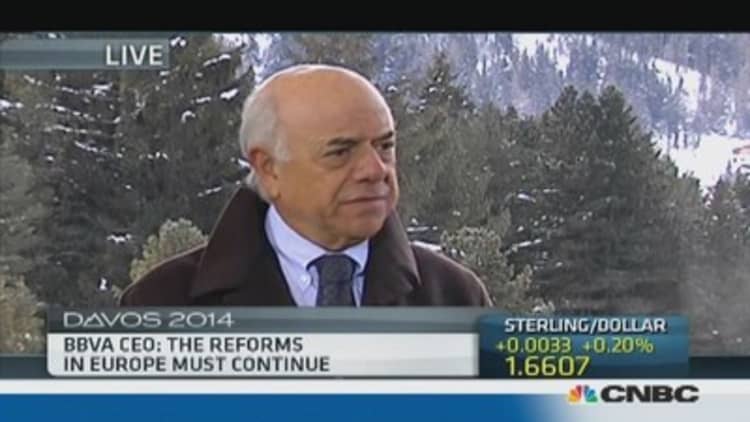Sterling rose to an almost three-year high against the dollar on Thursday on growing expectations that robust economic data will lead the Bank of England to raise interest rates sooner than previously flagged.
The pound rose as high as $1.6635 in late afternoon trade, its highest level since mid-August 2011. It marked the fifth straight day of gains for the pound against the dollar and left the currency's trade-weighted index around its highest since the 2008 financial crisis.
A sharp drop in the British jobless rate to 7.1 percent on Wednesday along with recent data that has shown a sustained pick-up in consumer demand has firmed up forecasts that the BoE will be the first major central bank to raise rates, even possibly before the end of the year.
The greenback fell to a one-week low against the euro and Swiss franc. It also fell sharply against the yen, following a weak Chinese manufacturing number. Soft factory data from China sent Asian stocks lower, losses that persisted in Europe and Wall Street and boosted demand for the safe-haven yen.
The , meanwhile to its lowest since July 2010. It was last at US$0.8754, down 1.1 percent.
"With the market of the view that the European Central Bank is going to be conservative when it comes to monetary policy easing, strong manufacturing data just pushes further back the possibility of any unconventional policy, which tends to lift the euro," said Shahab Jalinoos, currency strategist at UBS in Stamford, Connecticut.
(Read more: Could this be the currency to short in 2014?)
Germany's private sector grew at its fastest pace in more than 2-1/2 years in January, while French business activity shrank less than forecast.
The move by the Swiss government, meanwhile, bolstered the Swiss franc because it raised expectations for currency repatriations to the banking system, Jalinoos said.
The dollar dropped 1.5 percent against the Swiss franc to 0.8973 franc. The euro, on the other hand, was 0.5 percent lower at 1.2288 francs.
(Read more: Yen set for worst year since YMCA topped the charts)
The Swiss government cited "a considerable risk for the stable development of the economy" driven by strong growth in mortgage loans and residential property prices.
"This clearly shows the SNB (Swiss National Bank) is on a path where it can get more restrictive," said Ulrich Leuchtmann, head of currency research at Commerzbank in Frankfurt.

"It limits the upside potential for euro-Swiss franc," he added. "I don't think they'll abandon the 1.20 (per euro cap on the franc's value) but there will be enough speculation in the market about how long it can continue."
The euro rose 1.1 percent against the dollar to $1.3692.
Against the yen, the fell 1.3 percent at 103.14. The yen drew safe-haven bids after China's flash Markit/HSBC PMI index fell to 49.6 in January from December's 50.5, suggesting a mild slowdown at the end of 2013 has continued into the new year.
(Read more: This could be the hottest currency trade of 2014)
Against commodity currencies, the U.S. dollar fared better.
Currencies
Comments from the Bank of Canada, which said currency depreciation should help exports, knocked the Canadian dollar to a fresh 4-1/2-year low. The U.S. dollar was last 0.2 percent higher at C$1.1106.
(Read more: Rate hike talk boosts New Zealand dollar)
One trader played down the importance of the Chinese survey, however, saying the fall offered an opportunity to buy back the Aussie.
The falls will be welcome for hedge funds, who are betting that both the Australian and Canadian dollars will weaken against a strengthening U.S. dollar as the Federal Reserve scales back its bond-buying.
Latin American currencies also weakened as investors worried about prospects for the region's commodities exports to China. Concern that the Federal Reserve could reduce its monthly bond purchases by another $10 billion next week also weighed on investors' sentiment.
Argentina's official exchange rate tumbled more than 10 percent, its biggest single-day loss since a financial crisis devastated the country in 2002.
Argentina's peso on the interbank market, which is controlled by government, tumbled 11 percent to 8 pesos per dollar, following a 3 percent slide in the previous session. On the black market, the peso changed hands at 12.85 per dollar.
—By Reuters

